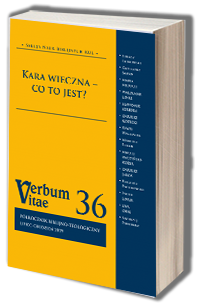Κόλασις w literaturze helleńskiej: od Tukidydesa do Pseudo-Timajosa
The κόλασις in Hellenic Literature: From Thucydides to Pseudo-Timaeus
Author(s): Ewa OsekSubject(s): Theology and Religion
Published by: Katolicki Uniwersytet Lubelski Jana Pawła II - Wydział Teologii
Keywords: κόλασις; semantics; ancient Greek literature; Classical period (510-323 BCE); Hellenistic period (323-31 BCE)
Summary/Abstract: A subject of this paper is the semantic analysis of the Greek verbal noun κόλασις in Hellenic literature from its beginning to the composition of the New Testament. Part one of the article presents the lexicographical definitions and etymology of the κόλασις. Part two is to analyze the semantics of the word in classical period. Part three discusses meaning of the term in Hellenistic period. Part four contains a conclusion to summarize all analyzed occurrences and to classify meanings of the word. The semantic analysis of the κόλασις usage in the Hellenic prose of Classical and Hellenistic periods enables us to specify its dozen meanings. These are following : political and economic sanctions; lopping a tree; repression; punishments or rewords that motivate people; disciplining, upbringing ; legal punishment; reformative punishment, such as flogging, fining, dishonoring ; deterrence, such as banishment, decimation, capital punishment; revenge, reprisal, such as torturing, starving ; earthly punishment; eschatological punishment; divine retribution. Among occurrences there are only eight items that refer to eschatological punishments, of which two (observed in Clearchus of Soloi and Diodorus Siculus) denote the divine retribution which potentially can be eternal.A subject of this paper is the semantic analysis of the Greek verbal noun κόλασις in Hellenic literature from its beginning to the composition of the New Testament. Part one of the article presents the lexicographical definitions and etymology of the κόλασις. Part two is to analyze the semantics of the word in classical period. Part three discusses meaning of the term in Hellenistic period. Part four contains a conclusion to summarize all analyzed occurrences and to classify meanings of the word. The semantic analysis of the κόλασις usage in the Hellenic prose of Classical and Hellenistic periods enables us to specify its dozen meanings. These are following : political and economic sanctions; lopping a tree; repression; punishments or rewords that motivate people; disciplining, upbringing ; legal punishment; reformative punishment, such as flogging, fining, dishonoring ; deterrence, such as banishment, decimation, capital punishment; revenge, reprisal, such as torturing, starving ; earthly punishment; eschatological punishment; divine retribution. Among occurrences there are only eight items that refer to eschatological punishments, of which two (observed in Clearchus of Soloi and Diodorus Siculus) denote the divine retribution which potentially can be eternal.
Journal: Verbum Vitae
- Issue Year: 2019
- Issue No: 36
- Page Range: 335-372
- Page Count: 38
- Language: Polish

